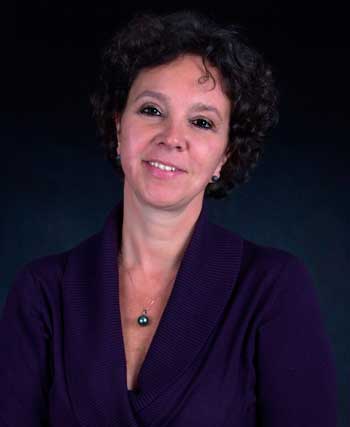
 Monique Maissan is an EO Shanghai member, CEO of Vision Textiles and founder of Waste2Weave.
Monique Maissan is an EO Shanghai member, CEO of Vision Textiles and founder of Waste2Weave.
“Be the change you wish to see in the world,” is the quote attributed to Mahatma Gandhi. During a trip to that great Indian leader’s homeland, EO Shanghai member Monique Maissan experienced a kairos moment, realizing her true purpose: To empower women in India’s handloom industry with a living wage for textiles produced from recycled plastic yarns. Her entrepreneurial journey, like so many others’, is a winding road that continues to unfold.
We asked Monique about a recent milestone on her journey: How establishing a revolving fund for micro-entrepreneurs to buy supplies and equipment became the gateway for generating this elegant solution.
Forming Waste2Weave
Monique’s social enterprise, Waste2Weave, got its start after she discovered fabric made from recycled plastic and witnessed the abhorrent conditions suffered by artisans in India’s handloom industry. She essentially linked a rural, third-world problem with one of the world’s ubiquitous environmental challenges through the beauty and inspiration of fashion.
Learn more about how Monique is solving social and environmental issues with fashion in her Inc.com post.
The Waste2Weave mission statement makes a bold promise: “Women out of poverty, plastic out of the environment.” She partnered with Technology and Action for Rural Advancement (TARA), Dr. Ashok Khosla’s full-service IT company, to provide local management and support in achieving this goal.
Establishing a Revolving Fund
Once she set her mind to enable rural weavers to create fabric from recycled plastic yarns for the fashion industry, Monique had to find a way to supply these weavers with the necessary equipment. In collaboration with TARA, she established a revolving fund—an innovative micro-finance model which helps scale the Waste2Weave program. By combining outside investment with a committed sales and distribution channel, the total value of the community and its products is enhanced.
Waste2Weave sets up clusters involving three parties: a hand-looming entrepreneur, an investor with US$15,000 as a revolving fund, and the backing of an Indian bank. The revolving fund helps entrepreneurs buy the looms and yarns needed, and supply a healthy work environment including rent, electricity and necessary amenities such as plumbing.
Waste2Weave guarantees the cloth produced will be purchased at a fair price, ensuring a minimum wage of US$140 per month per artisan, which covers all costs plus a margin for the entrepreneur.
The revolving fund is only needed during the set-up of a new cluster. After three years, the US$15,000 is either returned to the investor or used again to support a new cluster and create another source of hope for additional women and their families. During an agreed period, 5% interest is paid on the investment.
“We have commitments from great people and companies, and are looking for many more people to support us as we scale up,” Monique says. “This is a very direct way to change people’s lives, and it is not charity: It is a social enterprise which makes money, thus creating jobs and funds for the local community.”
Engaging Social Entrepreneurs
 “I am an entrepreneur who strongly believes that it’s possible to have a great, profitable business while accomplishing good things. It is my life’s goal to offer this business model to all individuals and corporations in the world,” Monique states. She emphasizes that it’s critical to focus on saving the environment and improving livelihoods, but we must always do so sustainably: “The model must be profitable; otherwise it won’t be scalable and able to create true impact.”
“I am an entrepreneur who strongly believes that it’s possible to have a great, profitable business while accomplishing good things. It is my life’s goal to offer this business model to all individuals and corporations in the world,” Monique states. She emphasizes that it’s critical to focus on saving the environment and improving livelihoods, but we must always do so sustainably: “The model must be profitable; otherwise it won’t be scalable and able to create true impact.”
The green industry, of which this kind of upcycling is a part, is growing exponentially. Plus, the Millennial generation is willing to spend extra money on products that have a positive social impact. As Monique explains, “It is not only great to do good, but it can also be very attractive financially.”
Read how plastic bottles become fabric in part two of the Waste2Weave story.
Each garment and product produced by Waste2Weave—like the one pictured above—includes a label stating the number of recycled plastic bottles used to produce it. The Waste2Weave handloom products include a QR code so that consumers can learn about the individual artisan in India who produced the fabric for their product.
Joining EO
“I joined EO last year, and it has profoundly impacted me. For the first time, I have a group of business experts seriously considering my problems and sharing their own experiences as a basis for solutions,” says Monique.
“This has made issues easier to solve, so I can focus more on what is important: scaling this model successfully to make a real impact on the world. As a social entrepreneur, my call-to-action is to ask consumers to choose products wisely and push their employers and other organizations to use products that help people and the environment. I encourage each of you to get involved yourself and make some real changes, literally be the change you wish to see in the world.”
Impacting the Future
Monique aims to grow Waste2Wear into a world-renown recycling company and scale her social enterprises.
To support these efforts, Monique is moving away from the operational aspect of her company to establish a global network of partners, investors and customers by speaking at conferences and symposia that emphasize the environment and sustainability. “I love to tell our story, and I will do so passionately to attract corporations to buy our products, join our social enterprises, create awareness and incite a mindset shift for their employees, their customers and the next generation.”
EO Shanghai member Monique Maissan is a social entrepreneur connecting a third-world problem with a worldwide environmental catastrophe through the beauty of the fashion industry.
Categories: general WOMEN ENTREPRENEURS
